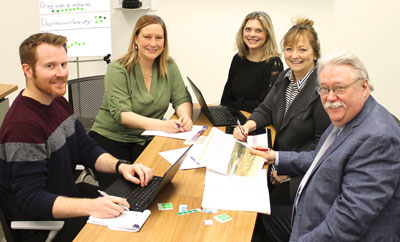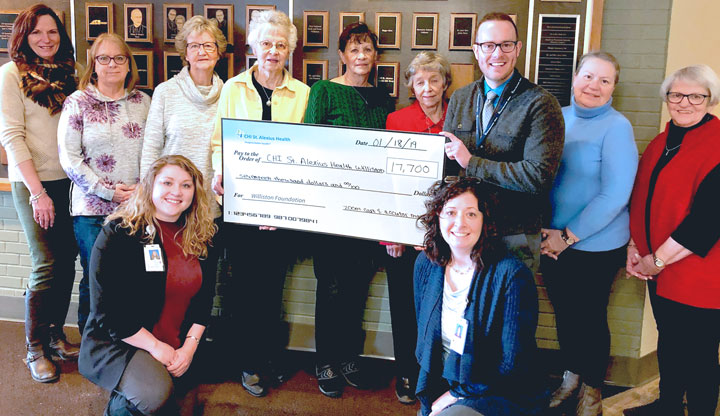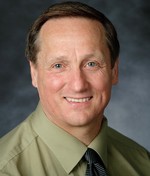Looking at Communities' Changing Needs
By Marv Leier on
Rural America, much like the rest of the world, is changing and so are the health needs of rural citizens. Therefore, it is important to have systems in place to re-evaluate and guide the changing health priorities of North Dakota.

The Center for Rural Health (CRH) at the University of North Dakota School of Medicine & Health Sciences helps North Dakota's rural health organizations adjust to the changing landscape by guiding them through a community health needs assessment (CHNA) process. A CHNA is a tool that helps North Dakota's Critical Access Hospitals (CAHs) and local public health units bring focus to their communities changing rural health needs.
Kylie Nissen, CRH senior program coordinator, works with the CAHs, public health units, and their community members to gather input for CHNAs. Nissen said it is important for people invested in their communities to be a part of this process. "The whole community benefits from the assessments," said Nissen.
Dan Bjerknes, VP of Hospital Operations, CHI St. Alexius Williston Medical Center (WMC), views the community input as essential to the mission of WMC.
We want to be responsive to the medical and health needs of our service area. While we usually have a pretty good idea what those are, the input of the community is essential in seeing the bigger picture from the perspectives, values, and priorities of those we serve.
"We want to be responsive to the medical and health needs of our service area," said Bjerknes. "While we usually have a pretty good idea what those are, the input of the community is essential in seeing the bigger picture from the perspectives, values, and priorities of those we serve."
For nearly four decades, the CRH has worked with the state's healthcare organizations on a variety of projects that improve the lives of rural citizens. However, it wasn't until 2010, shortly after the Patient Protection and Affordable Care Act (ACA) was signed into law, that the CRH started guiding rural community leaders, citizens, and stakeholders in the CHNA assessment process.
The goal of the ACA is to focus on provisions to expand coverage, control healthcare costs, and improve the healthcare delivery system. A stipulation of the ACA requires hospitals that want to maintain their charitable care and nonprofit status to create CHNAs and corresponding implementation plans that address the communities' most pressing health needs. These plans must be filed with the Internal Revenue Service as part of the hospital's tax statements.
Healthcare organizations are required through the ACA to conduct CHNAs every three years. The CRH, currently in its third cycle of conducting CHNAs, is learning that the health needs of many communities change over time. Therefore, repeating the CHNA process every three years is turning out to be beneficial, even though it requires a great deal of work.
For most hospitals, conducting a CHNA isn't just something that they do because it is an IRS mandate. It is something they do because they care about what the needs are of their community and they want to make it as healthy of an environment as possible.
"For most hospitals, conducting a CHNA isn't just something that they do because it is an IRS mandate," Nissen said. "It is something they do because they care about what the needs are of their community and they want to make it as healthy of an environment as possible."
When the CHNA process started nearly 10 years ago, the number one concern for the majority of North Dakota rural health organizations and communities was the need to recruit and retain more healthcare providers. Today, the majority of communities across North Dakota identify mental and behavioral health as the biggest area of need. Many communities say there is an increasing need for mental and behavioral health services and providers. They say there is a lack of resources for those misusing alcohol and drugs or for those dealing with medical conditions such as depression.
Workforce concerns, including primary care provider recruitment, retention, and access to specialists, are still issues for many North Dakotans. However, compared to the results from the first assessment cycle, healthcare workforce concerns have dropped to the third most pressing need. The other common issues center on access to aging services, obesity, and overall health and wellness.
Other identified areas of need that are often mentioned include healthcare costs, childcare, jobs with a living wage, attracting young families, violence prevention, transportation, healthcare for children, and dental access. Many of these needs are considered social determinants of health – the circumstances in which people are born, grow up, live, work, and age, along with the systems in place to deal with illness.

"What people don't often realize is that the health of a community isn't just the healthcare facility's responsibility," Nissen said. "There are many components that determine health outcomes. The CHNA process provides an opportunity to get the community's feedback and opinions regarding issues that affect their health, and it is also an opportunity for the citizens to learn about the roles different community aspects place on their health."
Hospital administrators agree that being able to reassess and reprioritize the health needs of the community as society changes is important.
"To meet the broader goals of our community in regard to health and wellness, we need to build relationships and work together with multiple partners and community members to achieve those broader goals," said Bjerknes. "CHNAs are a good tool because the process involves local input that results in a better care, better health, and lower health costs to the communities."
View North Dakota CAHs CHNA results and implementation plans.


 was formerly the Communications Manager at the Center for Rural Health at the University of North Dakota (UND) School of Medicine & Health Sciences in Grand Forks.
was formerly the Communications Manager at the Center for Rural Health at the University of North Dakota (UND) School of Medicine & Health Sciences in Grand Forks.



